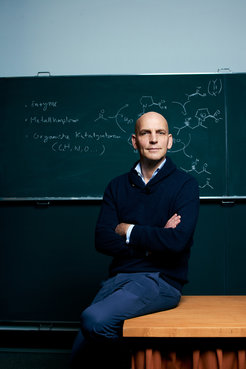Acids might help to skip
a step towards fine chemicals
Chemist Benjamin List receives ERC Advanced Grant
The European Research Council has announced that it will fund Benjamin List’s research with another ERC Advanced Grant. In his new project List wants to tackle “Early Stage Organocatalysis”.

The costs for heating and for petrol are exploding. No wonder the usage of our precious resource petroleum is omnipresent in the media. However, fossil materials such as petroleum or coal are so much more than fuel. They serve as the basic material for many important products, including pharmaceuticals and polymers. Benjamin List, director at the Max-Planck-Institut für Kohlenforschung in Mülheim an der Ruhr and Chemistry Nobel Laureate 2021, wants to improve the industrial usage of petroleum. The European Research Council will fund the project with one of their sought-after Advanced Grants.
Ben List’s research group wants to skip some steps in the production of valuable chemicals from petroleum, the so-called “black gold”. These fine chemicals are of great importance for the pharmaceutical or chemical industries. The benefits are obvious: Shortening the process chains safes time and resources. Usually, petrochemicals are first turned into bulk chemicals before being transformed into fine chemicals. List is planning to go directly from petrochemicals to fine chemicals – with the help of high-precision tools: organocatalysts.
The project “Early-Stage Organocatalysis” (ESO) describes the production of advanced molecules from petroleum. The catalyst is a molecular tool that helps to start up a reaction or fasten it – without being consumed. The reduction of energy consumption is the biggest advantage of a catalyzed chemical reaction. Catalysts exist as enzymes in our bodies or as metal containing varieties in our cars. Chemists always aim to find out which catalyst is the ideal candidate for each reaction.
While many of the classic catalysts contain a metal, Ben List and his team work with organocatalysts, a type of catalysts developed by List more than 20 years ago. As the name suggests, organocatalysts consist of nothing but organic molecules. These catalysts are often easier to produce and more sustainable than their metal containing variants. In his new “ESO”-project List counts mainly on the catalytic power of acids.
List is convinced that acids may serve as universal tools in chemistry. The preconditions for them to work as catalysts are – in theory – quite simple. All that is required, at least in principle, for acid catalysis to occur is the availability of electron density at the reacting substrates of the catalyzed reaction, List explains. “We are convinced that the vast majority of reactions can be catalyzed by acids”. Now he and his coworkers are about to create the ideal acid catalysts.
The European Research Council will fund the “ESO”-project with millions of Euros over the upcoming years. For Ben List, “ESO” is already the third successful ERC Advanced Grant in a row. This year, 1735 have submitted their projects, 253 of them will get the funding. The ERC will distribute 624 million Euro in 21 countries.





